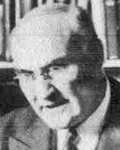"When we read any passage, let us first ask ourselves this question: What does the text actually say? Then let us set to work to discover its meaning." |
*
THE SECOND STEP IN INTERPRETING THE SCRIPTURES
In the last installment of this series we studied what I designated as "The First Rule of Interpreting the Scriptures." In our examination of this first step we saw that a person must understand who the author of a writing is, the time of his writing, the occasion of his doing so, the specific purpose for which he wrote, and the times in which he and the people addressed lived. When anyone has this data, he can, as a rule, interpret more accurately what is said. He can catch the drift of the thought and can see the connection between statements more clearly than otherwise.
The next rule for the interpretation of language as it pertains to the Scriptures may be stated thus: The second step in interpreting, the Scriptures is to discover the facts and the truths presented in a given passage and to note the exact wording of the text. Having gleaned all that we can from the data in hand regarding the author and the recipients of a communication, the times and the seasons, and the occasion of such a communication, a person is in a position to apply the second rule or step of interpretation in his effort to get at the message which the author intended to convey.
I. Analysis of the Rule: The Collection and Classification
of the Facts and Truths
We are part of all we meet. Life is a chain of causation. All consequences have antecedents. In view of these axiomatic truths one must collect the facts of any given text and classify them properly, relating each of them to those with which it is associated - if there be any connection.
A. Collection of Facts and Truths of a Given Text
It is necessary for us to note carefully every statement that is made and every fact that is stated, regardless of whether or not it is an historical fact or a scientific truth or principle.
We are living in a practical world. The visionary has great difficulty in such a workaday atmosphere as that in which we live. A person must keep his feet on the ground even while he is attempting to reason out a thing or to theorize regarding any matter. Facts are facts - things that have actually taken place. Facts always overthrow theories that are not in harmony with truth. Whenever, therefore, there is a conflict between theories and facts, we must throw the theories into the discard and hold to the facts.
There are great and fundamental principles or truths in every sphere of man's activity. The physical world is controlled by laws which have been imposed upon it by the all-wise Creator. In the realm of mind there are likewise principles which are just as unbreakable, and which are as unvarying as any of the laws of the material realm. In the field of ethics and religion there are also truths and principles. These are likewise inflexible. They can never be set aside with impunity. In the same manner there are principles and truths that are operating in the spiritual realm. These are likewise unchangeable and unvarying.
In view of the facts just stated, whenever a person is reading the Scriptures, he should endeavor to glean every fact and to note every principle that is set forth in a given passage. In other words, let me say that words are symbols of ideas. Every word and every group of words set forth a definite, specific meaning. This statement is especially true with reference to the Scriptures, which are the profoundest writings and which are more than the writings of uninspired men. God has preserved this information for us. We should therefore endeavor to discover the facts that are stated and to take note of the principles and truths set forth.
B. The Classification of Facts and Truths of a Given Text
The classification of the facts and truths which are presented by any text of Scripture is of the utmost importance. A sentence consists of various parts of speech. In some of the more involved sentences every part of speech is used. In many of them the same part occurs over and over again. In a well-written paragraph each sentence is properly related to the general thought which is being set forth in such a section of a document. As we analyze a sentence or a paragraph, it is most important that we notice the time element, if any be given. We must take note of the type of sentence used: whether it is a declaration, an interrogation, or a command. It is likewise imperative that the reader note the subject of the sentence or the theme of the paragraph or composition. Is the subject of the sentence acting or is it being acted upon? What motive, if any, may be discovered prompting the act? Is anyone affected by what is said or done? The facts that are discovered must be related and classified--those that pertain to the physical phenomena as well as those that are operative in the sphere of psychology or the spiritual realm.
C. Noting the Exact Language
In anyone's speaking of the collection and classification of facts and truths, it is necessary for him to refer to the analysis of the sentence, looking at the various parts of speech employed and the relation of one to another. A little further caution is necessary: A person must look at the exact words that are used. If possible, he should know the original meaning of the words in English. There is a fundamental thought that is enshrined in every word. Usage, however, frequently modifies terms and adds additional ideas. In this connection let me say that it is most important to notice the small words. They are frequently of as great importance as the larger ones. Sometimes, on account of the fact that prepositions are small, short words, we ignore them. But they indicate the exact relation between words. Conjunctions are no less important. Certain particles lend shade and color to thought. This is especially true in the Greek. A person must therefore note accurately the exact wording of a passage, if he is to formulate a correct, definite, specific idea of any given text.
II. The Application of This Rule
Haying analyzed the principle involved in the rule which we are studying, let us now apply it to certain passages of Scripture, taken from different sections of the Word.
A Historical Utterance
As the first example let us notice Genesis 1:1,2: In the beginning God created the heavens and the earth. And the earth was waste and void; and darkness was upon the face of the deep: and the Spirit of God moved upon the face of the waters.
According to the second law of interpretation we are to discover the facts and principles, if any, involved in this statement. In verse 1, which is one of the profoundest utterances in the entire Word of God, we learn a number of facts. The phrase, in the beginning, is adverbial and refers to that part of eternity which antedated time. Time began with the creation of the universe. Thus the beginning which is spoken of here is that part of eternity which antedated the creation. Back in that part of eternity God existed. He is the Eternal, the Everlasting God. He is the Uncaused Cause of all things. He is the one who supports the material universe and is carrying it forward to a grand consummation. He is the one in whom we live, move, and have our continual being. Volumes could be written concerning the Almighty.
In this verse we are told that this omnipotent, self-existent Being whom we know as God put forth the act of creation. An examination of this word discloses the fact that it means to bring into being that which had no prior form or substance before His performing this act. A study of the Scriptures shows that no one is capable of putting forth this act except the omniscient, omnipotent God.
That which the Almighty created, according to the verse which we are considering, was the heavens and the earth. Heavens includes all the celestial bodies throughout the vast extent of space. Modern astronomical instruments are bringing within the range of man's vision fields of space never dreamed of before our day and time. When larger and more efficient instruments are made and new methods of investigation are discovered our ideas of the universe will be enlarged and our conception of the omnipotence of God greatly enriched. While we are interested in the heavens and the celestial bodies, we are greatly absorbed in this earth upon which we are living. Thus in this one verse, which in the Hebrew has only seven words, we are given the profound, majestic statement concerning the beginning of physical phenomena, the sphere of the spirit world. This verse combats and refutes polytheism, pantheism, materialism, and idealism. In fact, it overthrows all the modern false philosophical conceptions concerning the origin of the universe and gives us the most rational, logical account of it.
In the second verse our attention is focused upon this earth. We are told that it was waste and void. When we read this statement and recall Isaiah 45:18, which tells us that God... formed the earth... and created it not a waste, we come to the conclusion that evidently, since God's works are perfect, the earth was wrecked after its being created. Thus an accurate rendering of the Hebrew of Genesis 1:2 would be: But the earth became a desolation and a waste. We are also told that darkness was upon the face of the deep. The implication of this statement is that there was light here first, but that after the catastrophe, darkness enveloped the earth.
Some time after - we know not how long or how short the period was - the Spirit of God moved or brooded upon the face of the waters. Why He did this we are not told in this connection. As to who is meant by the Spirit of God we are not told here. When, however, we read this statement in the light that is thrown upon it from other related passages, we know that the one called the Spirit of God is none other than the third person at the Holy Trinity, the Holy Spirit.
Thus in our applying the second rule of interpretation to this passage, we analyze the two sentences constituting these two verses. We look at the various phrases, nouns, verbs, prepositions, and adjectives. We likewise take note of the meaning of these words. We determine the exact and accurate signification of each term. By our doing this, we discover the facts and truth that are set forth and thus get a definite, specific idea of the truth that is conveyed.
In the application to these verses of the principle under consideration, I have been able only in the briefest manner to refer to the great facts and truths that are set forth in these marvelous statements. A large volume could be devoted to the discussion of this passage. But my analysis will suffice to show the importance of noting what is said in a given text. Thus, when we read any passage, let us first ask ourselves this question: What does the text actually say? Then let us set to work to discover its meaning.
A Prophetic Utterance
It is now in order for us to turn to a different type of statement to be found in the Scriptures. Genesis 1:1,2 is historical. Let us look at a prophetic utterance: Why do the nations rage and the peoples meditate a vain thing? The kings of the earth set themselves, And the rulers take counsel together, Against Jehovah, and against his anointed, saying, Let us break their bonds asunder, And cast away their cords from us (Psalm 2:1-3).
By paying careful attention to what is said in this passage, we understand that the psalmist, by the Spirit of God, saw a forthcoming international, atheistic, anti-Semitic, anti-Christian, politico-religious convention. The marginal reading of the first question, which is literal, is this: Why do the nations tumultuously assemble? Evidently the nations are assembling in a tumultuous gathering. Is this statement to be taken literally? We know that it is physically impossible for the two-billions of peoples of the world to gather together in any one assemblage. But, according to verse 2, the delegates to this convention are the kings and the rulers of the earth. This second verse enables us to understand the meaning of the first one. The purpose of this gathering is to meditate what the psalmist calls a vain thing - something that will fail utterly. When we recognize that this is a prediction of a convention to which kings and rulers of the world are the delegates, we see that it is a prediction of an international gathering. That it is an atheistic convention is evident from the fact that it is Against Jehovah. That it is anti-Semitic is seen from the further fact that it is against Jehovah, the God who revealed Himself to Israel, and who throughout the Old Testament speaks of Himself as the God of Israel. That it is anti-Christian is also seen from the fact that it is against God's anointed, His Messiah.
After much debate the following resolution will be put before the house for a vote: Let us [the convention] break their [Jehovah and His Messiah's] bonds asunder, And cast their cords from us. The words of these verses, if they mean anything at all, mean just what is indicated above. They mean nothing more, nothing less. Of course each idea could be enlarged upon and the picture could be brought out in bold relief; but these are the fundamental thoughts of the passage.
Has such an international gathering ever been called to do away with the religion of God and Christ? Everyone who knows anything about history would answer in the negative. This prediction has never been fulfilled.
But someone calls my attention to the fact that these verses are quoted in Acts 4:25, 26 and are applied to the action that was taken by Pilate, Herod, and the Jewish Sanhedrin against the Lord Jesus Christ. But this was no convention. There were two petty Roman officials who were working in connection with the Jewish Sanhedrin against Christ. In no sense did they put forward the resolution, Let us break their bonds asunder, And cast their cords from us, and vote upon it. Since the action of these enemies of Christ did not fill out the picture of the original passage, we may be certain that that to which it is applied in the New Testament was simply a partial, limited, incomplete fulfillment of this prophecy. Moreover, we may be certain that it will yet be fulfilled literally--accordingly as it is written. We are therefore driven to the conclusion that this passage is a prophecy of the "forthcoming international, atheistic, anti-Semitic, anti-Christian, politico-religious convention."
We have discovered the facts that are stated in Psalm 2:1-3, have classified them, and have given special notice to the exact wording. We have not of course gone into an extensive study of this passage - which thing is not possible on account of limited space. (In my volume, Messiah: His First Coming Scheduled, I discuss Psalm 2 more at length.)
Another Utterance
Let us now look at John 1:1,2: In the beginning was the Word, and the Word was with God, and the Word was God. The same was in the beginning with God.
The phrase introducing verse 1, In the beginning, instantly reminds one of Genesis 1:1. When we read verses 3 and 4 of John, chapter 1, and compare the statement given in these four verses with Genesis 1:1, we are convinced that this phrase has the same signification in both passages, namely, that it refers to that portion of eternity which antedated time.
The next thing for us to note is the copula, was. The word standing in the Greek text indicates continuity in the past; and in this context, continuity in the past without any limits.
The subject of this sentence is the Word. The peculiar use of this term shows that it is employed with an unusual signification. When we study the various related passages, we see that it refers to one of the Holy Trinity, whom we know from other passages as the Son, second person of the triune Godhead. That this interpretation is correct is seen from the rest of this verse - and the Word was with God, and the Word was God. The preposition translated "with" indicates personal relationship. This one was in personal relationship, in fellowship with God; but He was not an angel, nor a cherub or seraph; but He was divine - as is indicated by the last of the sentence.
In order to forestall any false, erroneous positions and to insure the correct idea, the Apostle in verse 2 stated that The same was in the beginning with God. He was in fellowship and communion with God from all eternity. We could take up each word, examine it microscopically, and could, by turning to parallel passages, bring out the various shades of thought here presented. But these are sufficient to illustrate the importance of one's discovering the facts and the truths that are stated in any passage and of noting exactly what is said. In other words, these examples are sufficient to emphasize the importance of the second rule or step in interpreting the Scriptures.


